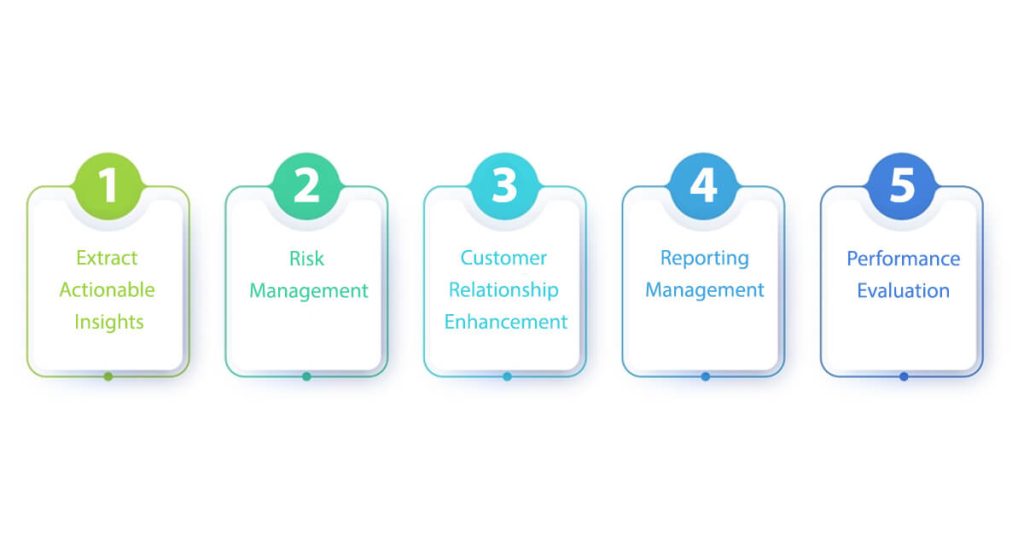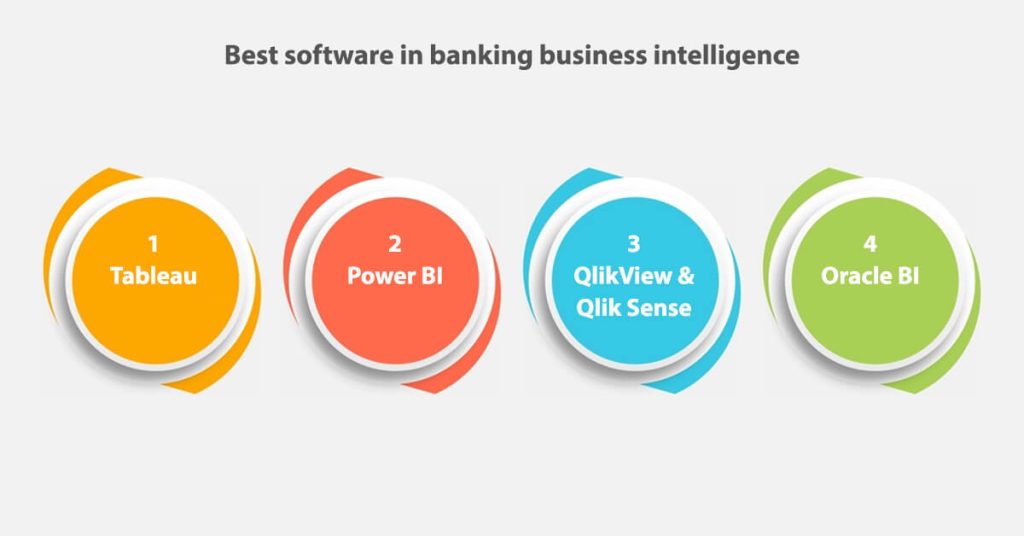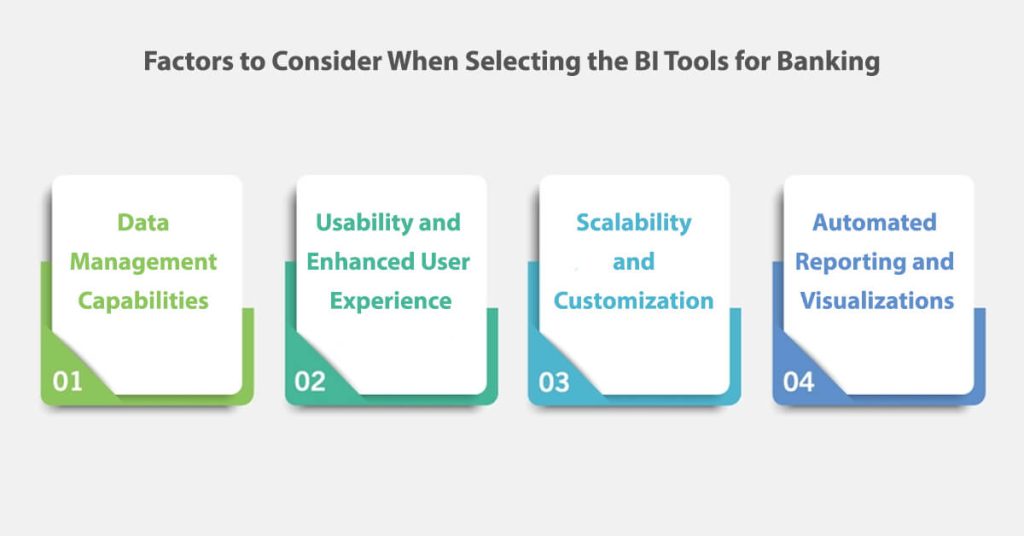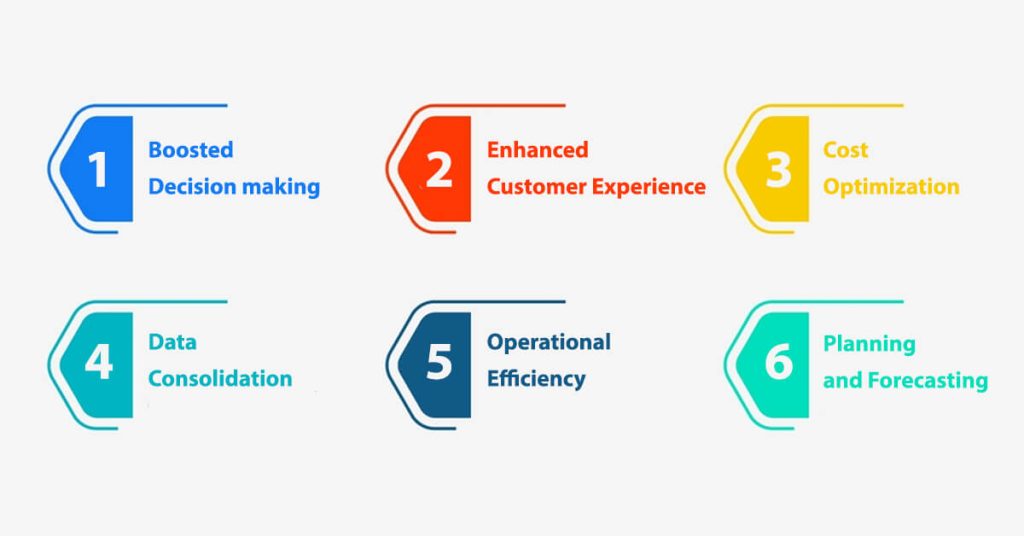Quick Summary
Understand how BI helps boost the banking industry with modern solutions. The diverse BI tools help in representing complex datasets into easy-to-understand forms and ensuring a smooth decision-making process. In this blog, we will realize the benefits, software, and other necessary aspects that help banks and financial institutions securely implement BI into their operations.
Introduction
In the data-driven digital market world, business intelligence is considered an important aspect of the smooth decision-making process. BI Solutions has transformed the banking and financial services segment by offering advanced tools for smooth risk management, real-time customer insights, and cost management. It is vital to ensure the successful implementation of robust BI, which is becoming an integral part of a successful business.
With the transformative potential of business intelligence consulting, banking, and financial industry. As per the report from McKinsey Global Institute, the open data ecosystem has the potential of a 1-1.5% GP boost till the year 2030 in the European Union, UK, and the USA.
What is Business Intelligence?
Business intelligence is a tool seamlessly implemented in diverse business segments and industries. Bi is useful for diverse segments and industries where much data is gathered daily. Banking and financial industries involve diverse datasets that must be processed and transformed into structured, easy-to-understand forms.
BI utilizes diverse data sources to assist with customer transactions, online interactions, loan applications, and market trends. The comprehensive financial insights help banks to seamlessly optimize operations, improve customer experiences, and mitigate risks. This helps them make informed strategic decisions.
How is the Banking and Finance Industry Utilizing Business Intelligence?

Banks, investment organizations, and financial institutions are shifting to advanced BI systems. It provides advanced insights into operational challenges, market dynamics, and market performance.
1. Extract Actionable Insights
Business intelligence is a technology-driven process of exploring and presenting a large volume of data in an easy-to-understand form that enables organizations to make strategic decisions. Advanced BI for financial services provides actionable data insights with comprehensive data analysis and forecasting of the market.
2. Risk Management
Risk assessments and mitigating are considered important to implement BI solutions in banks and financial institutions. This helps in the timely identification of unsafe financial transactions to make informed decisions and safeguard financial assets.
3.Customer Relationship Enhancement
It is essential for banking and financial organizations to boost customer relationships and satisfaction. They analyze customer data smoothly using banking business intelligence systems to automate data collection.
4. Reporting Management
Advanced BI in the banking industry provides user-friendly dashboards that enable businesses to use modern data visualization approaches. This assists in simplifying complex financial data for smooth decision-making by identifying trends.
5. Performance Evaluation
The modern BI tools enable comprehensive performance assessments of diverse financial services. These advanced tools assist banks in tracking KPIs to ensure customer satisfaction and top notch service quality.
Application of Business Intelligence in Banking
Business intelligence in retail banking helps banks leverage data to boost customer satisfaction. Let’s understand the applications of BI in banking to create customer-centric business strategies.
1. Analytical Customer Relationship Management (CRM)
BI tools provide advanced tools to analyze customer behavior and demand within a single platform. This enhanced analysis helps banks offer personalized services, creating and implementing targeted strategies by analyzing comprehensive data into integrated CRM.
2. Bank Performance Management
Financial institutions, organizations, and banks utilize advanced BI tools to monitor and optimize financial performance. This helps them make strategic decisions by leveraging insights from financial KPIs for enhanced financial services.
3. Enterprise Risk Management
Banks can leverage advanced BI to identify and mitigate the risks associated with internal operations. Advanced analytics can analyze historical data and market trends and assess risk factors to prevent financial uncertainties.
4. Asset & Liability Management (ALM)
The advanced BI tools help smoothly collect, analyze, and visualize data from various sources. This assists in gaining a better understanding of their asset and liability structure by monitoring cash flows, interest rates, and liquidity.
Take control of your brand’s narrative with our advanced sentiment analysis services!
Best software in banking business intelligence

1. Tableau
Tableau, a popular platform well known for offering intuitive and interactive visualizations to transform banks’ analysis and data interpretation. With the enhanced drag-and-drop feature, banking and financial professionals can create easy-to-understand dashboards to represent complex datasets.
2. Power BI
3. QlikView & Qlik Sense
These tools are revolutionizing data visualization in the banking and financial industry. It is well known for its associative model that allows users to collect and analyze data from multiple sources. Its self-service feature empowers users to create data-driven insights that help enhance data analysis.
4. Oracle BI
Oracle provides robust database management solutions and highly competitive BI tools to represent large amounts of data in a single platform. Oracle BI seamlessly integrates diverse banking operations to analyze customer behavior, trends, and inefficiencies.
Factors to Consider When Selecting the BI Tools for Banking

1. Data Management Capabilities
Diverse financial organizations and banks use diverse systems and platforms to manage data efficiently. An enhanced BI tool helps seamlessly integrate diverse sources and ensures smooth data preprocessing to streamline data analysis processes. It is also important to ensure that the BI tool can handle diverse data formats.
2. Usability and Enhanced User Experience
The BI tools help financial institutions and users by providing user-friendly solutions to ensure strategic decision-making processes. Banks can use intuitive designs to create interactive dashboards to determine performance and forecast trends.
3. Scalability and Customization
A modern BI tool should be capable of handling and managing large amounts of data. It is also important to fulfill the data management requirements with expansion and growth strategies.
4. Automated Reporting and Visualizations
The BI in the finance industry helps create interactive reporting using diverse options like graphs, pie charts, heat maps, etc. It also provides robust visualizations to identify trends and data patterns.
Detect, analyze, and respond to customer sentiments in real-time across multiple channels.
How Business Intelligence in Banking is Shifting the Paradigm?
BI aims to reshape the banking and financial segment to transform data utilization to make strategic decisions that help improve operations and boost customer engagement. Here’s how business analytics is revolutionizing banking:
1. Data Collection and Data-driven Insights
Banks traditionally relied mainly on manual data collection and reporting. Advanced BI tools has seamlessly transformed this process with real-time data analysis and actionable insights. Banking Dashboards assists in data-driven decision-making to boost efficiency and productivity.
2. Enhanced Customer Experience
Analyzing and understanding customer requirements helps provide top-notch services. Advanced BI tools help analyze customer behavior, preferences, and feedback to provide customized solutions.
3. Fraud Detection and Security
Security becomes the top priority in this modern scenario where cyber threats are potential. BI systems use predictive analytics and real-time monitoring to prevent fraud and boost customer satisfaction.
4.Optimized Risk Management
Financial risk, including credit, market, or operational uncertainty, is inherent in banking organizations. BI platforms enable banks to smoothly access risks using advanced analytics to minimize potential losses and enhance stability.
Benefits of Business Intelligence in the Banking Industry

Advanced BI helps identify and determine the financial data to enable real-time monitoring. There are diverse benefits of BI in the banking industry and how it creates a positive impact:
1. Boosted Decision-making
Analyzing customer preferences, trends, and financial business performance to create achievable product development approaches. BI systems provide real-time data accessibility and smooth analysis to make strategic decisions.
2. Enhanced Customer Experience
Banks can offer personalized services, targeted offers, and enhanced support by seamlessly analyzing customer preferences and behavior. This helps boost customer satisfaction by providing high-quality services.
3. Cost Optimization
4. Data Consolidation
Advanced BI systems integrate data from multiple sources, such as ATMs, online banking, and branch operations. This assists in providing a unified data representation of diverse bank operations.
5. Operational Efficiency
6. Planning and Forecasting
The BI enables banks to make enhanced financial forecasting to streamline long-term strategies. This assists banks in forecasting future challenges to mitigate the risks of uncertainties by staying ahead of the curve.
Conclusion
Implementing banking analytics solutions helps banking and financial institutions to transform their business models with personalized banking solutions. The expertise of X-Byte provides cross-selling opportunities in financial services to streamline the processes. This empowers seamless risk management to assist with growth strategies.
Frequently Asked Questions
How does BI help banks enhance customer experience?
Bi helps financial institutions and banks to analyze customer behaviors and preferences through smooth data analysis. Banks can easily offer tailored services and automated recommendations and improve service quality using data insights.
What role does BI play in fraud detection?
BI tools use predictive analytics and machine learning to determine unusual patterns in transactions, which helps banks to identify and prevent fraudulent activities.






